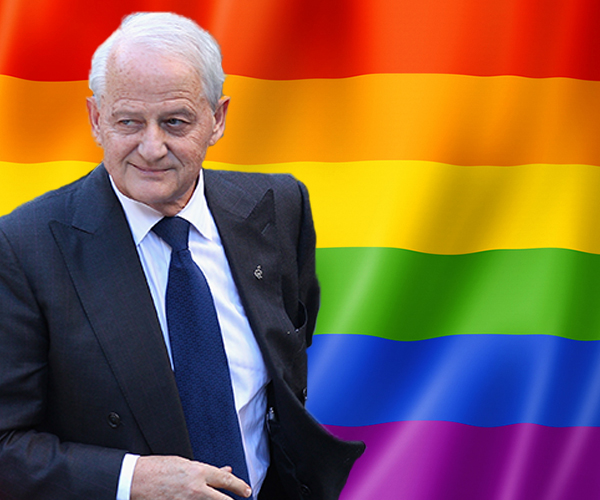During the same-sex marriage debate, we heard the phrase “religious freedoms” bandied about ad nauseum. People opposing marriage equality often hid behind the plateau, while pleading their case to not be persecuted for refusing someone service because of their sexual orientation.
When same-sex marriage was finally legalised, many left the term behind us. Well, thanks to the very party who brought us the postal plebiscite, it looks like we’re about to hear it a lot more often.
After legalising same-sex marriage, Turnbull established an “expert panel” to stifle the internal brawl in his party. The panel, which has launched a religious freedom inquiry that could recommend laws allowing discrimination in the name of religious conscience, is chaired by Philip Ruddock.
FYI, Ruddock is the same politician who was instrumental in John Howard’s amendment to the Marriage Act; in fact he was the man to introduce the bill that explicitly prevented any possible court rulings allowing same-sex marriages or civil unions.
Ruddock also stuck to his guns with his decision to deny a gay veteran’s partner a spousal pension, despite their 38-year same-sex relationship – a ruling the UN Human Rights Commission found to be in violation of equality and privacy rights.
Same-sex marriage supporters and its adversaries are equally as wary of the inquiry. Coalition MPs who support religious freedoms amendments and ‘no’ supporters were critical they had not been consulted during selection of the panel and said they “held little hope” the amendments would be revisited. However, advocates for marriage equality say that realistically, any law that protects those who discriminate under the guise of religion, or “religious freedoms”, will nullify the marriage equality, forcing members of the LGBTIQ community to once again fight for equality.
Religious freedom, in its essence, is meant to protect persons being discriminated against for their beliefs. It should also ensure no person can be forced to subscribe to any religion against their will – both commendable causes.
But at some point the phrase was distorted beyond recognition. During our postal plebiscite, and in the wake of America’s 2015 Supreme Court ruling, suddenly religious freedoms became synonymous with “discrimination without repercussions”.
It was a defence used by bakers who didn’t want to make cakes for gay weddings, by florists, photographers and celebrants who feel servicing a gay couple would defy their beliefs.
It’s a confusing concept because it is unequivocally illegal to discriminate against someone in a normal setting. If a gay man walked into a bakery and ordered a pain au chocolat, no baker would have a case to refuse service; to then enshrine “religious freedoms” in law so that bakers can discriminate against gay couples is nonsensical.
On the flip side, will this push for religious freedoms only cause further divisions. No one’s happy our government spent $127 million on a postal survey, regardless of which side they sit. If we now reel back the rights same-sex couples were just given, will there be total chaos?
Will the everyday Joe actively not work with businesses that are secular in a legal sense because they’ve refused to work with gay couples?
One of the submissions to the inquiry has been made by Freedom for Faith, a think tank led and endorsed by church groups like Hillsong, the Presbyterian Church and the Anglican Diocese of Sydney.
Religious organisations already have the legal right to refuse to perform weddings. Unlike secular businesses, religious organisations, i.e Churches, have the freedom to practice their own doctrines and marriage rituals for weddings held in their buildings by their celebrants. Essentially, the legalisation of same-sex marriage didn’t change anything for them.
However, the think tank proposed a Religious Freedom Act, to codify and expand the exemptions to anti-discrimination laws currently held by these organisations, according to The Sydney Morning Herald.
They want to further entrench protections for people who don’t want to be associated with same-sex marriage while simultaneously winding back anti-discrimination laws that have been encoded across all states and territories for years.
Basically, they want to be able to hire and fire teachers and workers in elderly care homes in “accordance with their values”. You know, like being free to fire gay teachers who have recently gotten married from Catholic schools.
But could this have ramifications Churches haven’t considered? Sure, parents might remove their children from schools teaching values not according with their own, but will parents also withdraw kids from schools that enforce such ‘freedoms’?
Will it effect our choices in wedding services, schools, aged care and bakers for the opposite reason religious organisations intend? If a baker refuses to make a cake for one gay wedding, will their business tank because people boycott them?
Another huge problem with the inquiry is that, unlike most parliamentary inquiries, the review is being conducting in secret, making it impossible for either side to defend their case.
For as long as we pretend “religious freedoms” means anything other than plain old discrimination, we’ll continue to find a balance between the two – an impossible feat. Hopefully the inquiry, and all their submissions, realise the freedom to religion, in its essence, is no greater or lesser than the freedom from discrimination.


.jpg)